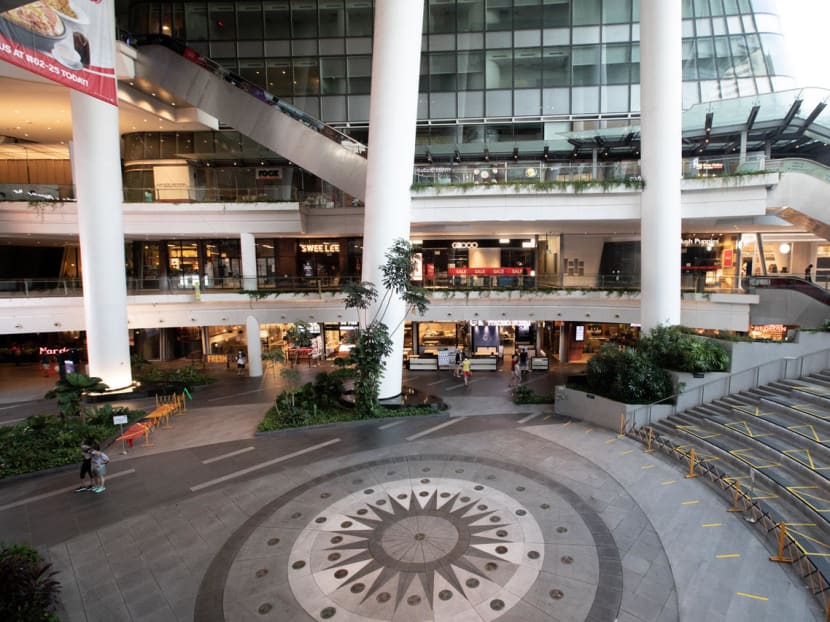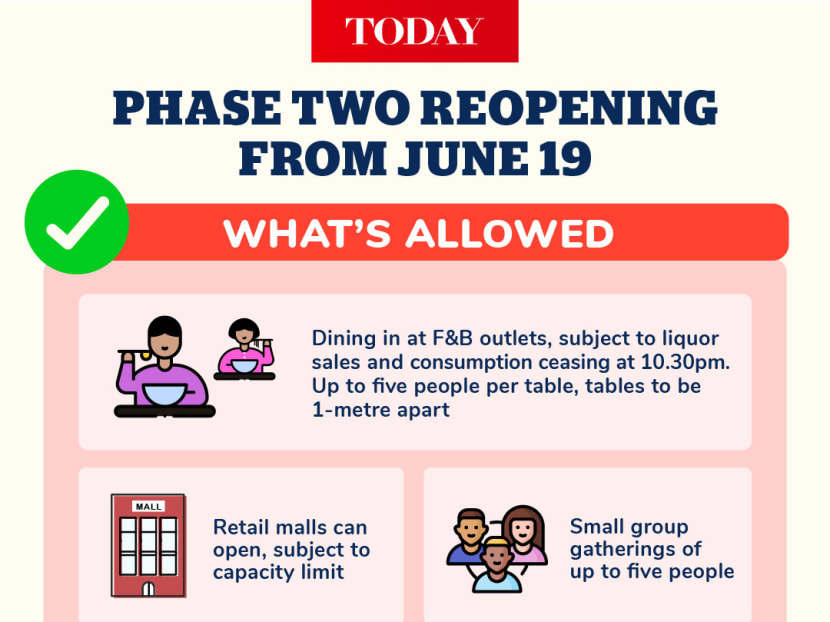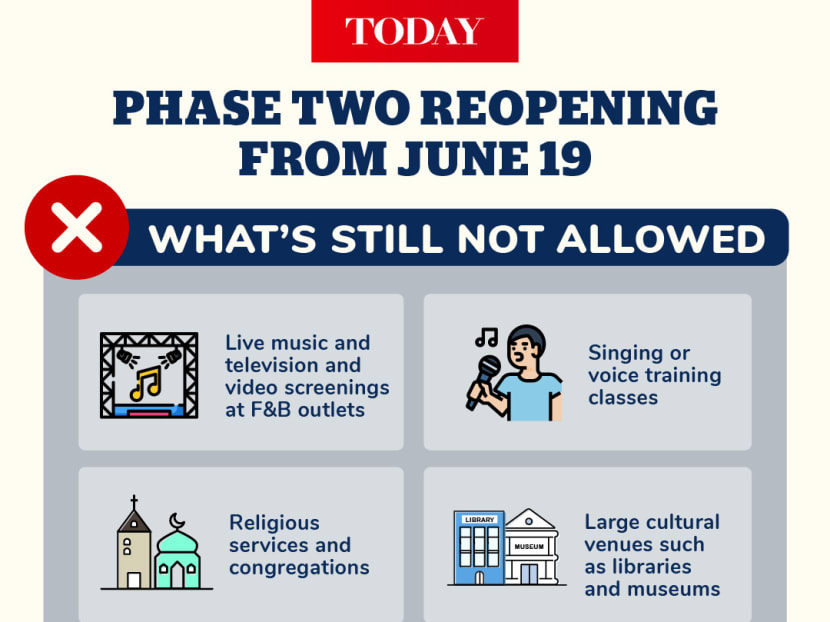Circuit breaker exit: Phase 2 starts from June 19, most activities including dining in, tuition classes, sports to resume
SINGAPORE — Dining in at restaurants, tuition classes and exercising at sports facilities and gyms are among several activities that will be allowed to resume from this Friday (June 19), with certain limits, as Singapore moves into the second phase of its circuit breaker exit.

All retail businesses will be allowed to reopen their physical outlets as Singapore moves into the second phase of lifting restrictions on activities.
SINGAPORE — Dining in at restaurants, tuition classes and exercising at sports facilities and gyms are among several activities that will be allowed to resume from this Friday (June 19), with certain limits, as Singapore moves into the second phase of its circuit breaker exit.
The limits include individuals having to maintain a distance of 1m from each other at all times, a maximum of five people allowed in any gathering, and tightened capacity limits at venues such as sports facilities.
Food-and-beverage (F&B) outlets will also have to stop liquor sales and consumption by 10.30pm every day, and everyone is still required to wear a mask while outside, except while eating or drinking.
All retail businesses will be allowed to reopen their physical outlets as well, and schools will gradually increase the number of students who can go back to campus for face-to-face lessons. By June 29, students from all levels will return to school daily.
The Ministry of Education will release more details later this week.
The multi-ministry task force that has been handling Singapore’s response to the Covid-19 pandemic announced on Monday that it decided to start Phase Two after 11.59pm this Thursday. This is because community infection rates have remained generally stable despite the increase in workplace activity in the first phase of reopening the economy.
The incidence of cases in migrant worker dormitories has also declined and there are no new large clusters emerging, it said.
Even as most economic activities are resuming, however, the task force reiterated that in the interest of reducing physical contact among individuals, telecommuting must remain the default for all businesses where feasible.
During a media briefing on the announcement, Health Minister Gan Kim Yong warned that with the range of activities resuming in the second phase and more people coming into contact with each other, Singapore can expect more new community cases of Covid-19. Ongoing proactive testing will also detect more community cases, he added.
“To keep the number of new cases under control and prevent large clusters, it is critical that we continue to remain vigilant so as to protect ourselves and our loved ones,” he said. “This way, our efforts over the last two months will not be wasted and we can safely move towards Phase Three.”
Singapore has been on a circuit breaker to restrict movement and activities in April and May before it ended on June 1, and the Government allowed selected activities to resume in the first phase of the exit.
Also at the briefing, National Development Minister Lawrence Wong said: “I want to appeal to all Singaporeans to be responsible in undertaking the activities that are permitted under Phase Two. Do not treat Phase Two as a signal that we can all relax, we can all let our guard down and we can now go out and do all our favourite activities.”
He warned that if everyone had that mindset towards this second phase, it would be “very easy” to end up with a surge in Covid-19 infections and “potentially down the road, (there is) the likelihood of having to reintroduce restrictions, which I don't think any one of us would like to see”.
ACTIVITIES TO RESUME
1. Retail businesses
Retailers will be allowed to reopen their physical outlets from Friday. F&B dine-in will also be allowed to resume, subject to liquor sales and consumption ceasing at 10.30pm every night.
However, live music, and television and video screenings will not be allowed in any F&B outlets.
Larger public venues with high human traffic such as malls and large standalone retail outlets will be subject to capacity limits, and operators will be required to prevent crowds or long queues from building up within and in the immediate vicinity of their premises.
2. Healthcare, tuition and home-based services
These will also be allowed to resume.
Registered clubs and societies will be allowed to operate at their registered premises.
Tuition and other private enrichment classes can resume, with the exception of singing or voice training classes.
Eldercare services in the community, individual health screening and aesthetic services will resume with safe distancing measures in place.
Face-to-face visits to residential facilities for seniors (including nursing homes, welfare homes, sheltered homes and adult disability homes) will also resume with precautionary measures in place.
3. Sports facilities
Sports, parks and other public facilities will be allowed to open.
These include playgrounds, beaches, lawns and fields, stadiums, swimming complexes, sports halls, hardcourts, gyms, fitness studios, bowling centres and function rooms.
This applies also to similar facilities in private settings such as condominiums and clubs.
The complete list of businesses that are allowed to operate can be found on the Ministry of Trade and Industry's website.
Businesses in this list do not need to apply for an exemption before resuming operations, but they are required to submit the number of workers who are working on-site via the GoBusiness portal within two weeks of the date of resumption of on-site operations.

SAFETY RULES IN PHASE TWO
The resumption of activities will be subject to the following safe distancing rules:
-
As a default, measures should be put in place to ensure that individuals maintain safe distancing of at least 1m at all times.
-
If it is not feasible or practical to apply 1m safe distancing between individuals, this requirement can instead be enforced between groups, with each group made up of not more than five people, and with no mixing between groups. Other safe management measures should also be in place.
-
Similarly, small-group social gatherings of up to any five people can also resume. Within the home, households may receive up to five visitors at any one time.
-
Wedding solemnisations at home and at the Registry of Marriages or Registry of Muslim Marriages may take place with up to 10 people, excluding the solemniser. At other venues, they may take place with up to 20 people, excluding the solemniser, subject to the venue’s capacity limit based on safe management principles.
-
For wakes and funerals, up to 20 people may be present at any one time.
-
The current safe management measures for workplaces will continue to apply. Employers must continue to ensure that there are no social gatherings among employees, and safe distancing of at least 1m is maintained at all times.
Mr Wong added that if a business owner has failed to put in place the necessary safe distancing measures and their business premises are overwhelmed by crowds, that would be a breach of the rules and the Government might have to ask the business to close temporarily, until it is able to execute the adequate precautions.
WHAT WILL NOT RESUME
The task force said that the resumption of other activities will take more time. These are activities or settings where large numbers of people are likely to come into close contact, often in enclosed spaces, and for prolonged periods of time.
“Overseas and local experience has shown that these settings can spawn large clusters of infections, given the number of close contacts among individuals in the course of such activities,” the task force said in a statement.

Such activities and settings include:
-
Religious services and congregations
-
Large cultural venues such as libraries and museums
-
Large-scale events and venues such as conferences, exhibitions, concerts and trade fairs
-
Entertainment venues such as bars, nightclubs, karaoke outlets, cinemas, theatres, as well as indoor and outdoor attractions
Government agencies have begun to engage relevant businesses and organisations on possible safe management measures to be taken for these activities or settings, the task force said.
Agencies will advise these organisations on the approval processes and timelines for their resumption at a later date, depending on the ability and readiness of the organisation to implement these measures.









